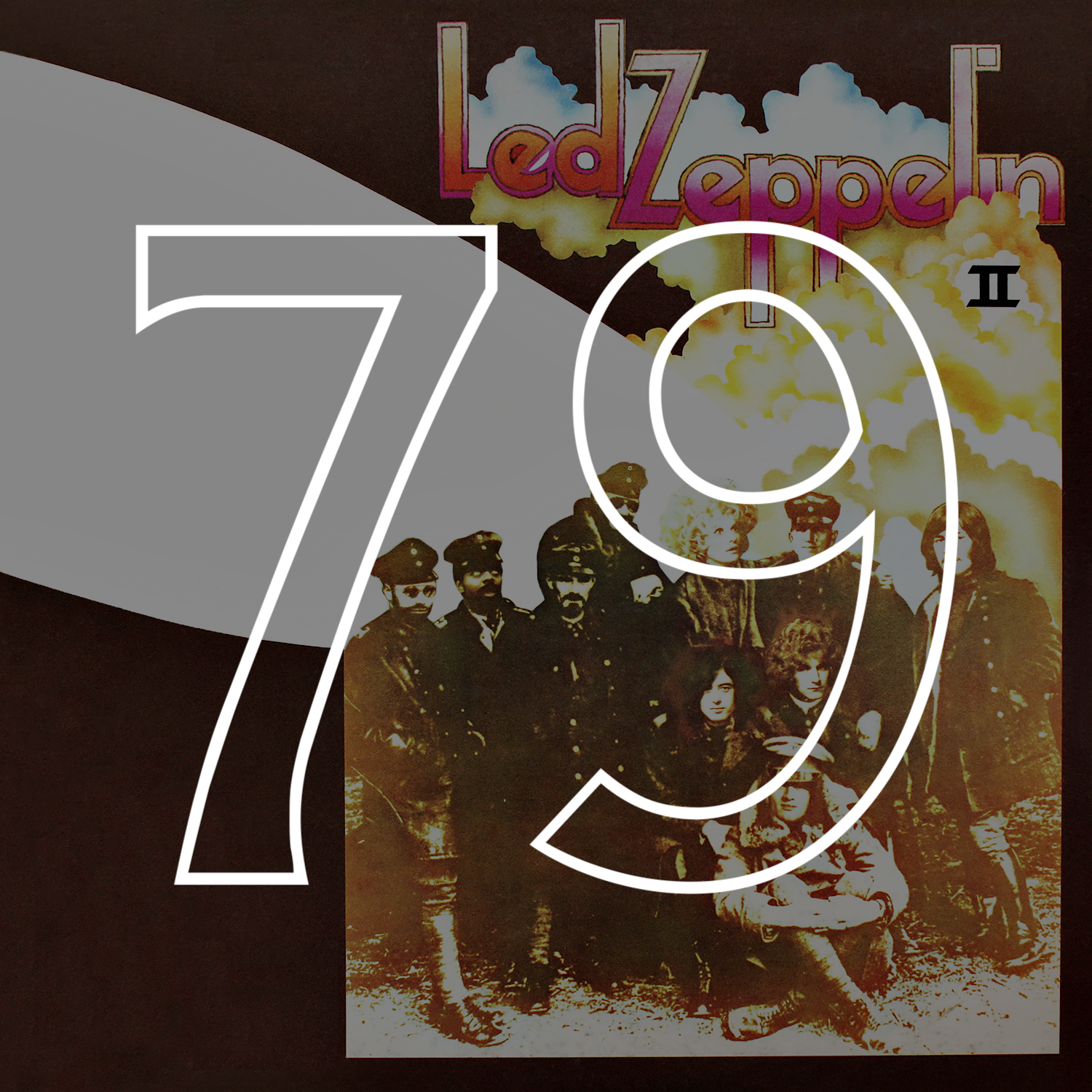#79: Led Zeppelin, "II" (1969)
Recently, at the age of forty, I had a ruptured aneurysm, which resulted in a subarachnoid hemorrhage. Most people die. I survived. You might be asking yourself what this has to do with Led Zeppelin’s second album, and the answer is nothing.
Perhaps I brought up my affliction after thinking about John Bonham dying young. John Bonham, the drummer for Led Zeppelin, was thirty-two when he died. He was found unresponsive after a night of heavy drinking. He had a family at the time and an incredibly successful rock band. Many think of him as the greatest rock drummer of all time. The similarities between us end before they begin.
I first remember listening to Led Zeppelin II and becoming enamored with both the band and the album during the Summer of 1991. I was thirteen, at camp that summer, and songs like “Whole Lotta Love” and “What Is and What Should Never Be” spoke to me. I recall going to a natural waterslide park (basically people go down rapids that have eroded some of the hillsides, so the rock path slides are smooth). The music was incredibly powerful. This was before I started listening to heavy metal, and Led Zeppelin was the perfect precursor. They straddled the line between metal and hard rock.
At the time, I think I would just listen to those first two songs off the album. I recall lying on the ground, bathing in the sun, eating Twizzlers, and listening to the compact disc for the first side of Led Zeppelin II. It was a highlight of that Summer. Come to think of it, it may have been a cassette tape.
Listening to the riff from “Whole Lotta Love” was revelatory.
In the film Almost Famous, members of a feuding rock band all start to sing “Tiny Dancer” together and it re-affirms their affinity/connection/what have you for each other. This, apparently, was influenced by an event where Cameron Crowe, the writer/director of Almost Famous, who had once been a rock critic for Rolling Stone, was on a tour bus in which a band started singing along with “Whole Lotta Love.”
I wasn’t the only one who felt inclusion with that song.
In 2008, Jimmy Page would perform the riff for Jack White and the Edge when they convened in the documentary It Might Get Loud. Jack White and the Edge, looked like two little boys who’d just witnessed something beyond the realm of their comprehension. The same exulted joy on their faces reminded me of my time at the natural water slides listening to overdriven blues riffs played with a ton of feedback.
Of course, there are those who would denigrate Led Zeppelin for their lyrics or originality with their songwriting. Zeppelin was sued by Willie Dixon for plagiarism.
He claimed the lyrics for “Whole Lotta Love” were taken from his song “You Need Love.” They settled out of court and Dixon is now a credited writer on “Whole Lotta Love.”
Similarly, Chester Burnett aka Howlin’ Wolf is a credited writer of “The Lemon Song,” since the song itself is basically a reworking of Burnett’s “Killing Floor,” a song which Zeppelin used to play.
You can make of that what you will.
Rounding out the rest of Led Zeppelin II are some other phenomenal songs: “Heartbreaker,” “Ramble On,” and “Moby Dick.” “Living Loving Maid (She’s Just a Woman),” “Thank You,” and “Bring it On Home” are also on the album.
“Heartbreaker” was a chance for Jimmy Page to demonstrate his chops on the guitar, as there are numerous solos and transitions.
“Ramble On” makes a lot of references to Tolkien and his Lord of the Rings mythology. In fact, I recall at one point in the song, the woman who the narrator is attempting to woo is kidnapped by Gollum. They probably should have included this in the film.
“Moby Dick” was an opportunity for Bonham to showcase his drumming skills. Mostly instrumental, the song lasted for more than fifteen minutes when played live.
While I never got to see the band play live, I did get to see all the living members of Led Zeppelin play. I saw Page and Plant touring together while I was in college, and John Paul Jones play as a solo artist opening for King Crimson after I had graduated. They all played some Zeppelin songs, but it wasn’t the same. That magic from when I was twelve on the natural waterslide was missing.
The innocence was gone.
I admire Led Zeppelin for their music, and I respect their decision to end the band in 1980 with the death of Bonham, rather than seek a replacement. They quit at the top of their game, and their legacy has remained intact.
Perhaps that is why the music has a special place for me; it doesn’t remind me of specific events per se, but rather an era, a time before things became complicated. When one could live off Twizzlers and go down rapids with reckless abandon.
I still can’t see very well, due to double vision, and at times I feel like a human bobblehead, but I am reminded of those carefree days eating Twizzlers, listening to Led Zeppelin II, and going down the rapids (not at the same time). Trying to hold on to the past, though, would be futile. Like when Heraclitus said, “You can’t step in the same water twice.” I wonder if he was at a natural water slide when he had that epiphany.
—Andrew Davie

